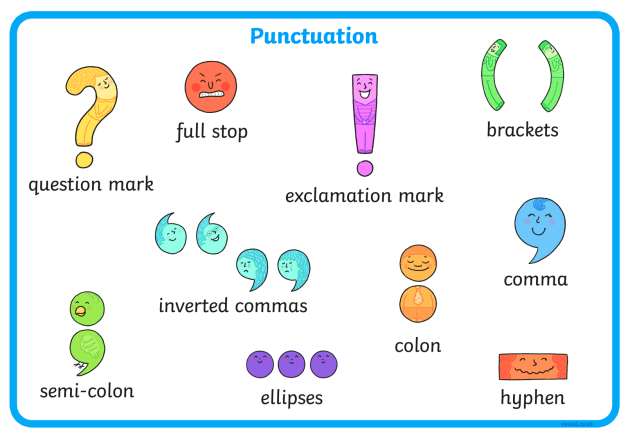Year 6 Exam > Year 6 Notes > Year 6 English > Punctuation
Punctuation | Year 6 English PDF Download
| Table of contents |

|
| Why do you need punctuation? |

|
| Sentences |

|
| Using Commas |

|
| Question Marks |

|
| Exclamation Marks |

|
Why do you need punctuation?
- Punctuation plays a crucial role in our writing. It prevents our sentences from becoming chaotic strings of letters and words and helps readers navigate text smoothly.
- Full stops are essential at the end of most sentences. They signal the reader to pause, take a breath, and transition to the next sentence. They help structure information clearly.
- However, sentences can end with other punctuation marks too, such as question marks or exclamation marks.

Role of Full Stops
- Full stops are essential at the end of most sentences as they signal the reader to pause, take a breath, and prepare for the next sentence.
- They help in dividing information into manageable chunks, aiding in comprehension.
- Example of Full Stops
- 'I love tennis.'
- 'I love rugby.'
- 'I love lots of other sports.'
Sentences
Full stops are versatile in creating various sentence lengths and types, each affecting the reader differently.
- Longer sentences are employed for detailed descriptions or explanations.
- Shorter sentences, on the other hand, are used for impact, emphasizing points, or building tension, such as "She stopped suddenly."
Using Commas
Commas play various roles:
- They help create a list.
- They indicate a pause in the sentence.
- They break up long sentences into more manageable parts.
Creating Lists
- Lists are helpful for grouping related items or topics together.
- For example: "I enjoy playing tennis, rugby, and other sports."
- The order of items in a list can impact the sentence's emphasis. For instance, "Jessica aimed to pass her exams, attend University, and become a doctor."
Indicating Pauses
- Commas can change the meaning of a sentence significantly.
- For example: "Let's eat, Lucy." (inviting Lucy to eat) vs. "Let's eat Lucy." (suggesting eating Lucy).
- When unsure about comma placement, try reading the sentence aloud and place commas where you would naturally pause.
Breaking Up Lengthy Sentences
- Commas are useful for separating additional information in long sentences, making them easier to understand.
- A clause forms the basis of a sentence, and commas can help segment sentences with multiple clauses for clarity.
- 'When Josh saw the food, his stomach started to grumble.'
- 'Josh used to stay up late playing video games, but then his mum found out.'
- A subordinate clause consists of a subject and a verb but cannot stand alone as a complete sentence. Subordinate clauses are dependent on the main clause for context and meaning, hence the need for a comma to connect them.
Question Marks
- Question marks are punctuation marks placed at the end of sentences to indicate that a question is being asked. They are essential for conveying queries and seeking information.
- Questions typically begin with words like "who," "what," "where," "when," or "why." These words signal to the reader that an inquiry is being made.
- For example: "Where is the nearest library?"
Exclamation Marks
- Exclamation marks, on the other hand, are used to express strong emotions such as surprise, excitement, force, or anger. They help convey the tone and sentiment behind a sentence.
- By using exclamation marks, writers can make it clear to readers the intensity of certain emotions or actions within the text.
- For example: "Wow! That was an amazing performance!"
Question for PunctuationTry yourself: What is the purpose of using full stops in writing?View Solution
The document Punctuation | Year 6 English is a part of the Year 6 Course Year 6 English.
All you need of Year 6 at this link: Year 6
|
26 videos|58 docs|10 tests
|
FAQs on Punctuation - Year 6 English
| 1. How do you use possessive apostrophes? |  |
Ans. To show possession with singular nouns, add an apostrophe followed by an s ('s) to the end of the word. For plural nouns ending in s, simply add an apostrophe after the s. For plural nouns not ending in s, add an apostrophe followed by an s ('s).
| 2. What do UK schools provide in terms of punctuation education? |  |
Ans. UK schools typically provide education on proper punctuation usage, including how to use apostrophes, commas, quotation marks, and other punctuation marks correctly in writing.
| 3. What are 5 frequently asked questions related to punctuation in UK schools? |  |
Ans. Some common FAQs related to punctuation in UK schools include how to use possessive apostrophes, when to use commas, how to use quotation marks, how to punctuate dialogue, and how to use semicolons correctly.
| 4. How can I ensure that my punctuation usage corresponds to the content of my writing? |  |
Ans. To ensure that your punctuation usage corresponds to the content of your writing, always consider the context and meaning of the sentence. Make sure to use punctuation marks appropriately to convey your message clearly.
| 5. What is the importance of using proper punctuation in exams and writing assignments? |  |
Ans. Proper punctuation is crucial in exams and writing assignments as it helps convey your ideas clearly and effectively. It also demonstrates your understanding of grammar rules and attention to detail in written communication.
Related Searches















